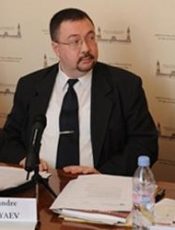In August, 2011, it was eight and a half years since Serbian Radical Party leader Vojislav Seselj had been, without a sentence, held in detention by the International Criminal Tribunal for the former Yugoslavia. The situation is unprecedented – among those to stand trial at the Tribunal, nobody else has seen the right to have his case heard within a reasonable period of time so openly neglected…The causes behind the Tribunal's conduct are not deeply hidden considering that, as of today, Seselj drilled more holes than anybody else in the reputation of the ICTY. Even at the cost of putting his own life in jeopardy, as during the 30-day hunger strike by which Seselj asserted his right to represent himself in court instead of dealing with Tribunal-appointed defense attorneys, the Serbian professor both continued to prove his innocence and to expose the prosecution's serial fabrications. In one of the episodes, Seselj had the Tribunal open a probe into the prosecution's attempts to coerce tens of witnesses into incriminating him. By the time, the witnesses had testified against Seselj both in Serbian courts and at the ICTY. The tribunal obviously hoped to have the inquiry maximally delayed or even postponed till the end of Seselj's trial, but was could not due to compelling evidence, the incurable problem still being that the expectations concerning the credibility of the probe are low.
Since Seselj was taken into custody, the Tribunal failed to move beyond the indictment phase which, with the court almost never convening over the past couple of years, only reached completion last spring. The defense phase giving the indicted a chance to invite his own witnesses and to disprove the testimonies contributed by those of the prosecution was supposed to follow, but, in another unprecedented breach of rules, the Tribunal stalled the process by declining to provide funding to Seselj's team of legal advisors. The Tribunal is predictably trying to shift the blame for derailing the defense phase of the trial onto Seselj, saying that he did not prove convincingly the absence of sufficient private funds for his own defense. A curious philosophy looms behind the idea, the indicted being offered to prove the absence of something. Outside of the ICTY legal wonderland, one would normally expect the Tribunal to undertake proving that Seselj has the needed financial resources at his disposal. Theso-called Directive on the Assignment of Defence Counsel, somehow issued by the Tribunal’s Secretary without the court's or the UN Security Council's oversight, establishes that the indicted must prove he has no money for his own defense, which is a clear departure from the presumption of innocence principle implying, in the context, that the Tribunal has to prove that the funds exist.
Part of the problem is that the exorbitant legal costs to be shouldered by the ICTY defendants can easily leave their families penniless. It is an open secret that anyone standing trial at the Tribunal automatically faces the prospect of bankruptcy as the hearings tend to last indefinitely, investigations have to be conducted in various, occasionally uncooperative, countries, and witnesses end up stuck in the Hague for weeks. The costs arising as a result add up to absolutely unaffordable amounts. The story of late S. Milosevic's secret accounts in Western banks quietly sank into oblivion while he stood the ICTY trial – unable to locate them and divert the money to the Yugoslavian leader's legal counsel, the Tribunal attempted to save face and covered the costs, thus de facto admitting that Milosevic's money was a myth. In Seselj's case, the ITCY is not even trying to look civilized: in the early 2011, the judicial chamber announced that it would provide to his counsel 50% of the normal legal costs of other defendants. The ruling is a parody of justice considering that legal advice to defendants must be covered for the period since the moment of the arrest, which, in Seselj's case, makes eight and a half years. Moreover, the Secretary continues to mount opposition to the arrangement, saying that the judges overstepped their authority since it is entirely up to him to decide whether the defendant actually has money or not.
No doubt, the judicial chamber's clash with the Secretary who staunchly holds his own is complete pretense. The judges' suggestion that Seselj, whose web site features Serbian Radical Party conferences drawing tens of thousands of his supporters, ask them to chip in Euro 1-2 apiece to pay for his defense reflects with utmost clarity the real position taken by the court. Their other ideas for Seselj were that he should take out a loan or sell his residence.
A curious line of conduct for what is supposed to be an intentional court, isn't it? If the Tribunal really wants to hear Seselj's defense, it should have no problem making the Secretary do what he is supposed to or replacing him. The truth is that all parts of the ICTY share the same objective, which is to make hearing Seselj's defense impossible. The reason why the Tribunal has a vested interest in preventing the defense hearings is that it would easily transpire in the process to what extent a number of the Tribunal's employees actually deserve to face justice. There is no hope that the trial of V. Seselj is going to be fair, meaning that the only proper solution is to immediately close the case and have him released.
No mater how the ICTY puts obstacles in the way of Seselj's defense, the case has already become historical. There is no strength in numbers – Prof. Seselj showed that even one man's resistance makes sense and can be successful, and that the Hague Tribunal is not invincible. The Tribunal's choice not to cover V. Seselj's legal counsel reads as an admission that the ICTY and its patrons have already lost the case.









